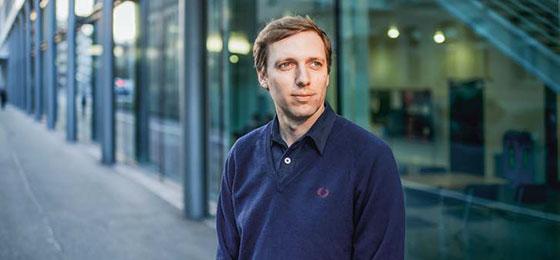"There's no good time to present inconvenient findings"

Dominik Hangartner is an expert on migration. His research has covered Swiss citizenship proceedings at town meetings, the labour market integration of asylum seekers, and prejudice towards foreigners. He takes all the media attention in his stride. By Pascale Hofmeier
(From "Horizons" no. 112 March 2017)
What's it like for a researcher to be in the political limelight?
I'm aware that we are researching into topics that are controversial – such as how long people should have to wait before they can apply for Swiss citizenship. Other policy matters, however, are astonishingly free of controversy. Such as the positive consequences of shorter asylum procedures. In a democracy, it's important to be able to demonstrate the pros and cons of different policies, and to do so with political independence. Our field of research is emotionally charged, but we aim to provide cool-headed analysis and objective instruments so that people can form fact-based opinions. The visibility of migration topics in many countries has meant an increasing interest in our work in recent years.
How do you cope when politicians appropriate your research results?
I have two tasks as a researcher. First, I have
to make accurate analyses, identifying
causes and effects. For example, if we shorten
an asylum procedure by two months, it
means refugees can begin working sooner.
This costs the state less and promotes integration.
Secondly, I have to ensure that our
results can be understood by both experts
and laypeople in the way that we have
quantified them. After all, our research is
funded by people's taxes. The better we succeed
in that, the less room there is for misinterpretation.
We can make suggestions
for better integration policies, but it's up to
politicians, administrators and the voters
to decide if and how our suggestions are to
be put into practice.
Have you ever considered withholding
results
for fear they'll be misunderstood?
This is one of the taboo topics among researchers.
There is rarely a good time to
publish inconvenient findings. Speaking for
myself, I have never been in that kind of situation.
But I think I have a pretty thick skin.
All the same, your work prompts all
kinds of reactions. Do you read the
commentaries
in the social media?
Sometimes. But that's not necessarily a
meaningful way to spend your time.
What about you: where do you stand on
the political spectrum?
My interest in migration as a topic is partly
due to my own biography. But this has no
impact on the scientific process by which
I conduct my research, or on the results I
get. I want to understand what works and
what doesn't. The analysis itself is a neutral
process. Nor do I have any incentive to
gloss over anything. Our society has political
instruments that can be expensive and
well-meaning, but that actually achieve
nothing. In such cases, a country has to review
what it's doing.
Should you intervene more in public debate?
My research takes place in the midst of our society. So I have to communicate my results to everyone who's affected, which in this case means all those who are involved in the field of migration. We also choose our communication partners systematically. We have presented our results on labour market integration to the European Parliament, and showed the representatives of different countries how they can make data available for further studies.
Your projects are international in focus, though you're Swiss yourself. Does this help you to remain more independent?
It helps. But what's relevant to Switzerland also meets with interest abroad. Lots of European countries were interested in our results on accelerating the asylum process. For example, we were asked about adapting it to the Finnish context. Our public relations work means we get many requests from countries outside Switzerland. This can help us to build up pressure for researchers to get access to data from those countries that had previously kept it under wraps.
Pascale Hofmeier is a science editor at SNSF.
The most recent findings
- A survey conducted among 18,000 people in 15 European countries shows that their preferred refugees are young, Christian, female, and well-educated; Muslims tend to be disliked. Science (2016)
- Although refugees in Switzerland can work while waiting for asylum, the length of the asylum process hinders the start of their careers. Science Advances (2016)
- Migrants integrate better when they are allowed to get citizenship. Proceedings of the National Academy of Sciences (2015)
The migration expert
Dominik Hangartner is a political scientist at the London School of Economics. In August 2017 he will be appointed Associate Professor of Public Policy at ETH Zurich. He is Faculty Co-Director of the Immigration Policy Lab with branches at Stanford University and the University of Zurich, and Head of the Asylum Policy and Refugee Integration Project at the National Center of Competence in Research (NCCR) 'On the move'.